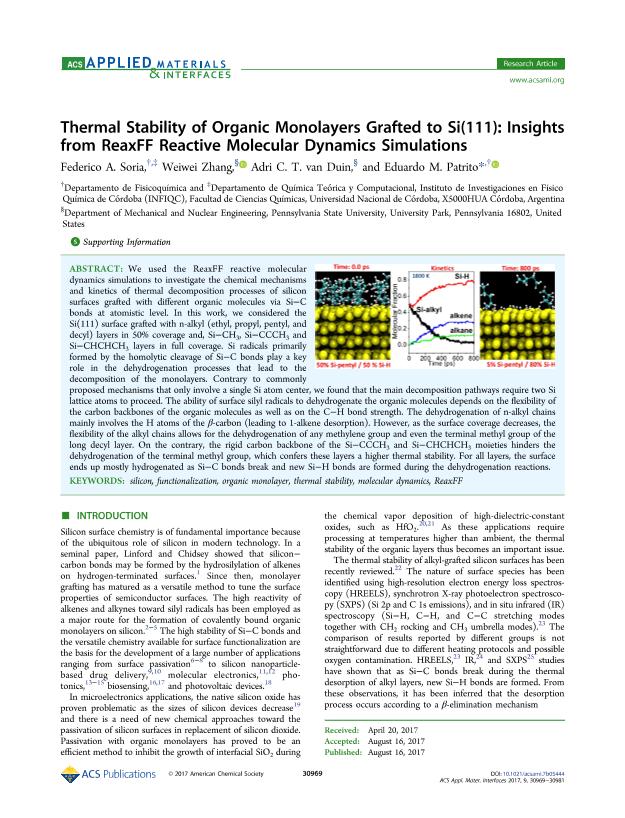Artículo
Thermal Stability of Organic Monolayers Grafted to Si(111): Insights from ReaxFF Reactive Molecular Dynamics Simulations
Fecha de publicación:
16/09/2017
Editorial:
American Chemical Society
Revista:
ACS Applied Materials & Interfaces
ISSN:
1944-8244
e-ISSN:
1944-8252
Idioma:
Inglés
Tipo de recurso:
Artículo publicado
Clasificación temática:
Resumen
We used the ReaxFF reactive molecular dynamics simulations to investigate the chemical mechanisms and kinetics of thermal decomposition processes of silicon surfaces grafted with different organic molecules via Si-C bonds at atomistic level. In this work, we considered the Si(111) surface grafted with n-alkyl (ethyl, propyl, pentyl, and decyl) layers in 50% coverage and, Si-CH3, Si-CCCH3 and Si-CHCHCH3 layers in full coverage. Si radicals primarily formed by the homolytic cleavage of Si-C bonds play a key role in the dehydrogenation processes that lead to the decomposition of the monolayers. Contrary to commonly proposed mechanisms that only involve a single Si atom center, we found that the main decomposition pathways require two Si lattice atoms to proceed. The ability of surface silyl radicals to dehydrogenate the organic molecules depends on the flexibility of the carbon backbones of the organic molecules as well as on the C-H bond strength. The dehydrogenation of n-alkyl chains mainly involves the H atoms of the β-carbon (leading to 1-alkene desorption). However, as the surface coverage decreases, the flexibility of the alkyl chains allows for the dehydrogenation of any methylene group and even the terminal methyl group of the long decyl layer. On the contrary, the rigid carbon backbone of the Si-CCCH3 and Si-CHCHCH3 moieties hinders the dehydrogenation of the terminal methyl group, which confers these layers a higher thermal stability. For all layers, the surface ends up mostly hydrogenated as Si-C bonds break and new Si-H bonds are formed during the dehydrogenation reactions.
Archivos asociados
Licencia
Identificadores
Colecciones
Articulos(INFIQC)
Articulos de INST.DE INVESTIGACIONES EN FISICO- QUIMICA DE CORDOBA
Articulos de INST.DE INVESTIGACIONES EN FISICO- QUIMICA DE CORDOBA
Citación
Soria, Federico Ariel; Zhang, Weiwei; van Duin, Adri; Patrito, Eduardo Martin; Thermal Stability of Organic Monolayers Grafted to Si(111): Insights from ReaxFF Reactive Molecular Dynamics Simulations; American Chemical Society; ACS Applied Materials & Interfaces; 9; 36; 16-9-2017; 30969-30981
Compartir
Altmétricas




